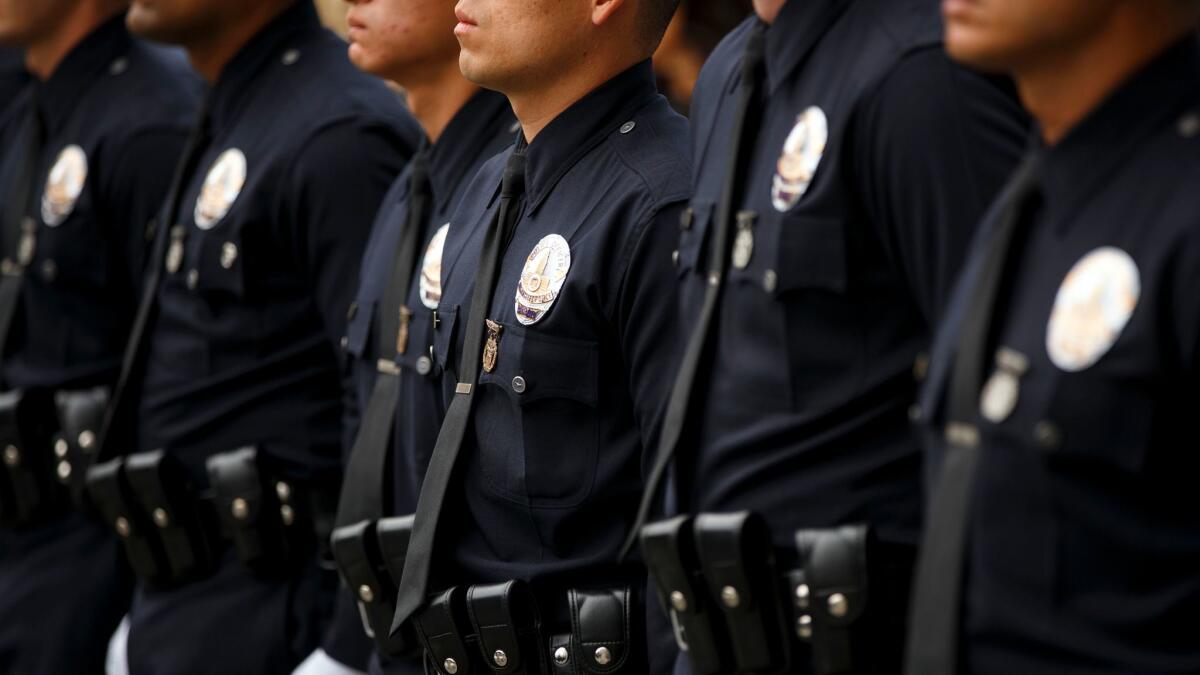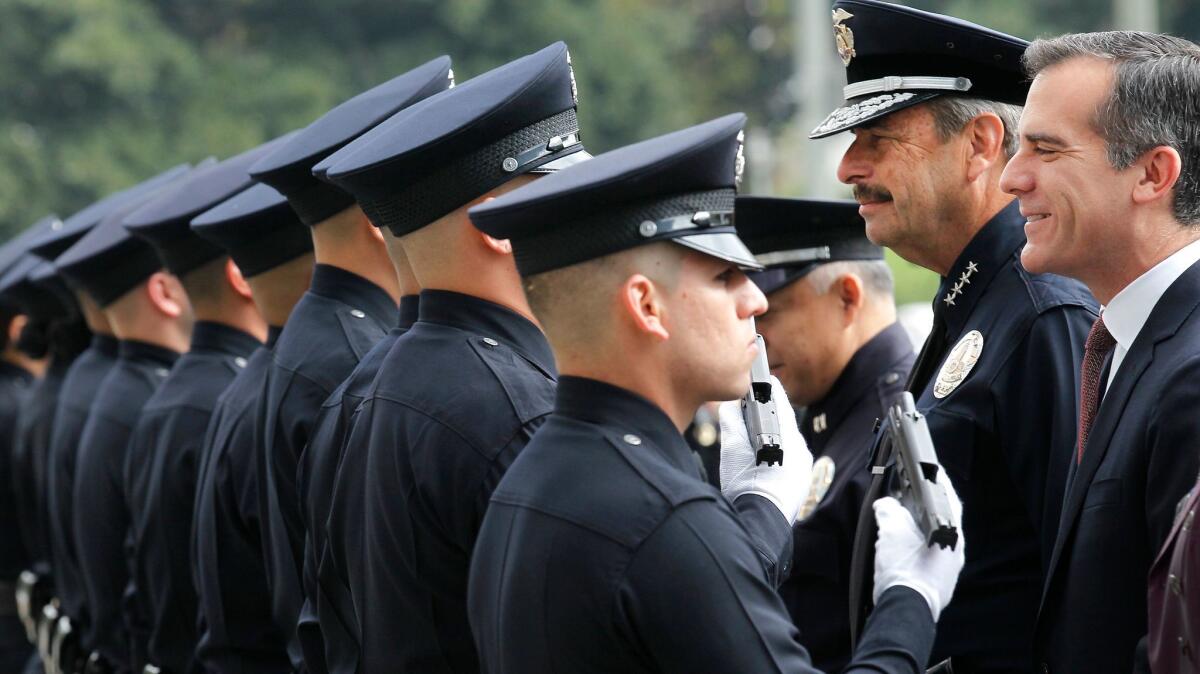Q&A: How would Charter Amendment C affect the LAPD’s disciplinary system?

- Share via
The Los Angeles Police Department’s disciplinary system is complicated and often criticized, drawing complaints from both inside and outside the department.
Some officers feel they are treated inconsistently or unfairly. Department brass has said disciplinary panels routinely impede the chief’s desire to fire problem officers. Outsiders are frustrated that the board’s activities are kept confidential under state law.
The department’s disciplinary process could undergo one of the most significant changes in decades if Los Angeles voters approve Charter Amendment C on Tuesday’s ballot. Here’s a breakdown of the measure.
What would Charter Amendment C change about the LAPD’s disciplinary system?
Under the current system, LAPD officers facing serious discipline — usually terminations — have their cases heard by a disciplinary panel, formally known as a Board of Rights. Currently, those panels are made up of two high-ranking officers and one civilian.
If approved by voters, Charter Amendment C would revise the City Charter to allow officers the option of having their cases heard by three-person boards composed entirely of civilians.
City Council approves ballot measure that could put more civilians on LAPD discipline panels »
Who are the civilians who sit on the panels?
Hired by the Police Commission and paid for their work, civilian panelists must have at least seven years of experience with arbitration, mediation or similar work — preferably residents of Los Angeles. Thirty-eight people currently are civilian panelists, most of them attorneys or professional arbitrators.
Amid complaints from opponents that the requirements exclude too many Angelenos, some city lawmakers have signaled an interest in exploring how to expand the pool of candidates.
Who supports Charter Amendment C?
The Los Angeles Police Protective League, the union that sponsored the campaign for Charter Amendment C, along with Mayor
Who opposes Charter Amendment C?
Organizations that focus heavily on police accountability are campaigning against the measure, including the American Civil Liberties Union of Southern California, Black Lives Matter, Los Angeles Community Action Network and Community Coalition. United Teachers Los Angeles, the League of Women Voters of Los Angeles and other groups have also come out against Charter Amendment C.
What does LAPD Chief Charlie Beck think?
Beck has not publicly expressed a position, saying recently he did not think it would be appropriate to do so. He did, however, point to a city report — one that relied heavily on LAPD statistics — that concluded civilians on the disciplinary panels tend to be more lenient than their sworn counterparts. Civilians, Beck said, “tend to be less likely to hold officers accountable.”
“I think the changes proposed in C would exacerbate that,” he added.
The systems of discipline are only as good as people’s belief that they’re being treated fairly.
— Deputy Mayor
Jeff Gorell
How did it get on Tuesday’s ballot?
Charter Amendment C was the product of extensive talks between Garcetti and the Los Angeles Police Protective League, which represents roughly 9,800 LAPD officers and has significant political clout at City Hall. The mayor’s top public safety advisor worked on the issue for more than a year with the union, which sought changes to the LAPD’s disciplinary process.
Those talks have prompted critics to portray the ballot measure as the product of a backroom deal between Garcetti and the union, which endorsed the mayor during his recent reelection campaign. Organizations that focus heavily on policing say they were locked out of the conversation — and were only asked to weigh in after the measure was a done deal.
Backers of Charter Amendment C dispute the notion that the measure is a backroom deal, saying voters will have the final say this week .
Why do supporters like Charter Amendment C?
The police union and city officials say officers have long felt that they won’t be treated fairly by a disciplinary panel on which two-thirds of the members work under a police chief who is suggesting serious punishment. They point to lawsuits filed by a handful of LAPD captains alleging they were retaliated against after going against Beck in a decision about discipline.
Allowing the option of all-civilian disciplinary panels, supporters say, will help assure officers that they’ll get a fair hearing.
“We have four current lawsuits against the city from senior officers,” Deputy Mayor Jeff Gorell said in a recent interview. “All of them include the accusation that there was retribution as a result of their decisions at a Board of Rights. So whether there's reality there, or whether there's just the perception of influence, the systems of discipline are only as good as people's belief that they're being treated fairly.”
Backers say the change would also allow greater civilian oversight of the Police Department.
This isn’t how policy should be made.
— Peter Bibring, director of police practices for the ACLU of Southern California
Why are opponents fighting it?
Opponents of the measure also have major complaints about the LAPD’s disciplinary system — pointing out that the hearings and decisions are kept secret. But they argue that Charter Amendment C is a bad remedy that could result in more lenient treatment of misbehaving LAPD officers.
They point to the city report, issued in January, that concluded civilians are less severe than their sworn counterparts when weighing LAPD disciplinary cases. They also say Charter Amendment C does not allow for true civilian participation, because most residents don’t have seven years of arbitration-like experience required for the job.
Finally, critics contend the mayor’s behind-the-scenes talks with the union show that elected officials were intent from the beginning on delivering a “political favor” to a powerful constituency.
“This isn’t how policy should be made. If elected officials are interested in public policy, they should invite input from all stakeholders and experts and have a public process to reach the best result possible,” said Peter Bibring of the ACLU of Southern California. “That’s not what happened here.”

What exactly did that city report say?
The report, prepared for city lawmakers using LAPD data, looked at 287 Board of Rights hearings held from 2011 to late 2016. In 190 of those cases, officers were found guilty of the accusations. Fewer than half of the officers Beck sent to a Board of Rights to be fired were terminated.
The report found that the civilian panelists were “consistently more lenient” than the sworn members. There were 39 cases in which Beck had suggested an officer be fired, but a board acquitted the officer instead, the report said. In all of those cases, the civilian voted to acquit.
Supporters of Charter Amendment C say the numbers don’t back up claims that civilians are too lenient. Union officials have said that cases are rarely decided by a divided vote. Out of 229 cases in which Beck recommended termination, just 7% involved decisions in which the civilian member was more lenient than at least one of his or her sworn counterparts.
There were no cases in which a civilian voted for a harsher outcome.
Legislative report on LAPD Board of Rights panels »
Why do voters make decisions about the LAPD’s disciplinary system anyway?
The Board of Rights system is outlined in the City Charter, the city’s governing document, whose language can be changed only by voters.
Although the Board of Rights hearings were established in 1935, it wasn’t until 1992 that civilians were added to the panels as part of Charter Amendment F — a police reform measure that won overwhelming support from voters on the heels of the Rodney King beating.
This year, opponents say such an important issue should not have been put before voters in an election that is expected to have extremely low turnout. There are no citywide candidates on the ballot, and only two of the council’s 15 seats are up for grabs Tuesday.
Sign up for Essential California
The most important California stories and recommendations in your inbox every morning.
You may occasionally receive promotional content from the Los Angeles Times.









